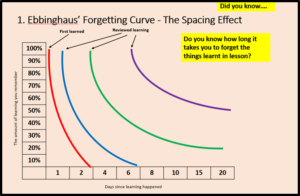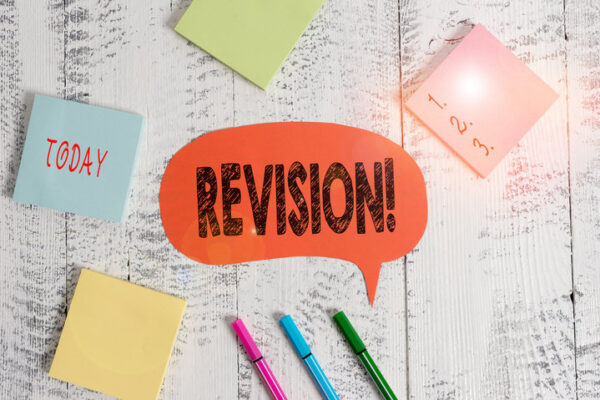Did you know that knowing how to revise is scientific? You need to understand how your brain retains information in order to revise effectively. This blog will offer a range of solutions to revise GCSE and A Level subjects. Read on to see how these strategies will support your child’s examination success.

Ebbinghous’ Forgetting Curve
This diagram shows how we need to revise new and important information regularly to ensure that the knowledge ‘sticks’. Information that is not reviewed is often forgotten after the second day; however, if you space out your revision, chances of moving this to long term memory improves by 60%! Whether it’s quotations for Macbeth, historical dates, or mathematical equations, you will need to revisit these regularly to know them for your examinations. Here are some techniques below:
Map it!
This is a simple tool and one that’s useful to use at the beginning of your revision. To start your mindmap, begin with the name of the topic you’re revising in the centre of the page. Then simply jot down everything you know about it. You can then start to make connections and expand your knowledge as your revision progresses.
Teach it!
This one is an absolute winner. Find someone ( ideally older than you) who is willing to give up some time to be your pupil, then prepare a lesson in which you will teach a particular topic to them. Most importantly, encourage them to ask you lots of questions if something’s not quite clear. Try to make your lesson varied and interesting: include explanation, diagrams, maybe even a PowerPoint presentation on the computer.
Quiz it!
Make a folder with plain sheets of paper, one for each subject that you’re studying. This can be done by hand or stored on the computer. When you’re revising a subject, pull out its sheet of paper and add some more quiz questions remember to note down the answer to each one as well. Find a study buddy, and swap copies of your quizzes. You’ll have a mixture of questions you’ve prepared for and ones they may not have thought of. Plus, this can make revision collaborative and fun!
Draw it!
Take a topic and turn your notes into a poster or annotated diagram with lots of illustrations and colour. Alternatively, create a cartoon strip version of your subject, for example describing an event in history or an experiment in science. Add speech bubbles and comments to explain what’s going on in each picture. Display posters in parts of your home where you’re likely to see them, for example by your bed or next to a mirror. Get creative!
Record it!
Talking about a subject can really help you understand it. Once you’ve made your notes, you could record yourself reading them out, then replay and listen to this later on. Alternatively, liven up your revision by turning your notes into a short newsflash or interview. You could even record them as a song or even a short play. Making an audio recording is great, as you can replay it when you’re feeling too tired to revise in a more active way. Why not listen to your revision notes in the gym or on the way to school?
Card it!
Instead of writing your notes on pages of paper, buy a pack of index cards and create a set of flash cards for each topic. Summarise one key concept on each card, using highlighter pens to pick out the most important words or underline them with felt-tip pens, and illustrate where it where possible with a picture. Use flash cards to record important diagrams for science and geography, learn formula for maths, and key quotations for English literature.
We hope that you find these techniques helpful. Remember, Choice Home Tutoring have specialist tutors and GCSE workshops available to support your child’s examination success. Contact info@choicehometutoring.co.uk for more information.

